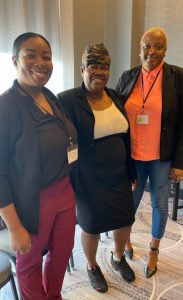
Ole Miss doctoral student Monica Coleman (left) supports a team of community volunteers during one of three meetings to create a ‘road map to housing’ for Tunica County. The project was funded by a UM Community Engaged Partnership Development Fund grant. Submitted photo
OXFORD, Miss. – When University of Mississippi graduate student Monica Coleman received a Community Engaged Partnership Development Fund grant in 2022, she knew she wanted to make an impact in her hometown.
“As a native of Tunica County, I wanted to go back and help the people who have poured so much into my life,” said Coleman, a doctoral student in counselor education. “I wanted to create an opportunity for them to come together and be heard.”
Coleman is one of numerous success stories resulting from Community Engaged Partnership Development Fund mini grants. Offered by the Division of Diversity and Community Engagement, the grants encourage partnerships between Ole Miss faculty, staff and students with communities outside higher education.
The 2024 grant application window is open through Oct. 31. Awards are up to $1,000.
“It’s been so rewarding to witness the results of our first two rounds of grants,” said Castel Sweet, director of community engagement and assistant professor of practice in community engagement. “Stories like Monica’s are inspiring – they illustrate the impact that local communities receive from this work, which is the reason we encourage these projects.”

Sheerah Neal Keith (left), a UM alumna who volunteered to help address housing needs in Tunica County; Mary Dramé, a board member for the Tunica County Community Development Coalition; and doctoral student Monica Coleman prepare to present their work with the coalition in St. Louis. Submitted photo
Coleman partnered with the Tunica County Community Development Coalition and its founder and executive director James Dunn to identify areas of need within the community. Her mission was to support local volunteers in addressing the area’s most critical needs.
“There are large amounts of problems in Tunica – education, mental health, job opportunities – and they had to see which ones we needed to prioritize,” she said. “They ultimately settled on housing because there wasn’t a central location to get support for those moving into the community or those who needed home rehabilitation.”
Over the course of the project, the community hosted monthly meetings and Coleman and her team led three empowerment meetings to set up a “road map to housing” in Tunica County. It was during this work that she met Mary Dramè.
Dramè, a Tunica resident, came to the initial meeting and “rose up as a change agent,” Coleman said. Her activism ultimately landed her a position on the Tunica County Community Development Coalition board and a fellowship with the Southern Poverty Law Center.
Although Coleman’s grant ended in May, her influence has helped Dramè continue the project.
“We finally found a new program that can help,” Dramè said. “They are helping to rehabilitate people’s houses, and I just put two people on the list. They will help them with things like fixing their roofs, addressing leaks and fixing rotten wood outside of the home.”
On Oct. 14, the Tunica County Community Development Coalition held groundbreaking ceremonies for self-help housing developments in Robinsonville and Hollywood.
Dramè said she was thankful for the partnership.
“It was very meaningful to work with the university,” she said. “It made me feel good that someone came in and wanted to help. Monica helped so much – she told me what I needed to do and how to go about helping people in the county.”
Additional past Community Engaged Partnership Development Fund projects have focused on the Oxford Community Market, Emmett Till Interpretive Center and Clinical Disaster Research Center, among others.
Applications for this round of grants may be submitted online until 11:59 p.m. Oct. 31.